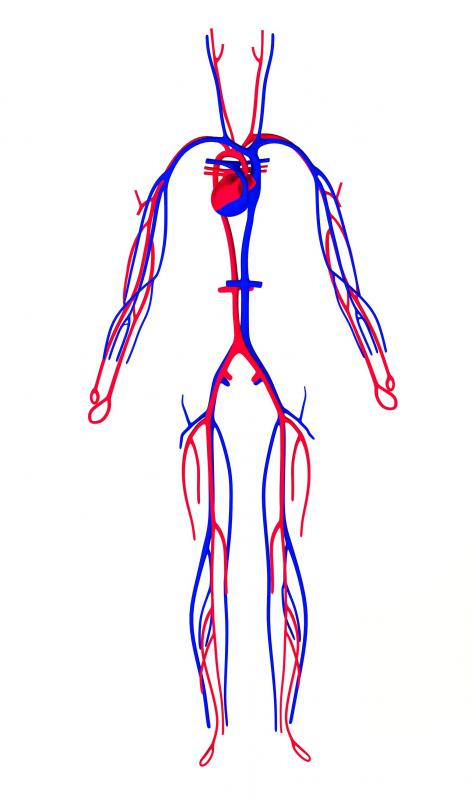At WiseGEEK, we're committed to delivering accurate, trustworthy information. Our expert-authored content is rigorously fact-checked and sourced from credible authorities. Discover how we uphold the highest standards in providing you with reliable knowledge.
What Is an Efferent?
A body structure that is described as efferent is a vessel that conducts material or information away from its source organ and out to the body. An efferent nerve, for instance, carries motor signals from the central nervous system (CNS) to the body’s muscles, telling them to contract. Similarly, arteries in the cardiovascular system are considered efferent vessels because they transport blood away from the heart and out to the body. Efferent is contrasted with afferent, which refers to vessels carrying material or information back toward their source organ, such as nerves transmitting sensory signals from the skin to the brain.
In the nervous system, nerves are bundles of neurons or nerve cells acting as conduits for electrical signals between the brain and the body. They can be thought of like electrical cords running between a power source and a device, only instead of carrying impulses from the source to the device, they transport them in two directions. Efferent neurons are those within a nerve that only conduct information to the muscles, while afferent neurons only send signals back to the brain and in some cases the spinal cord.

To understand how this works, imagine a hand over a lit candle. As the hand moves too close to the flame, temperature and pain receptors in the palm send sensory input along the afferent neurons in the arm to the CNS telling it the fire is hot. Once this information is processed, the CNS sends a motor signal along the efferent neurons to the relevant muscles, which in turn snatch the hand back.

The cardiovascular system also is a closed loop of afferent and efferent vessels. Arteries are the efferent blood vessels whose job is to take blood from the heart that has received oxygen in the lungs and distribute it to all of the body’s living tissues. Veins are the afferent vessels that circulate blood whose oxygen has been removed and replaced with carbon dioxide back to the heart so that it can be pumped through the lungs once more.

Aside from nerves and arteries, other bodily systems contain these vessels. The lymphatic system features lymph vessels that transport lymph, the watery fluid that removes toxins from the body’s tissues, away from the lymph nodes, thymus, and spleen, the immune-cell-containing organs of the immune system. In the male reproductive system, vessels in the testicles known as efferent ducts conduct sperm out of the testes. Lastly, there are specialized blood vessels in the urinary tract known as efferent arterioles that arise from a network of capillaries and that function to filter the byproducts of metabolism from the blood so that they can be excreted from the body in urine.
AS FEATURED ON:
AS FEATURED ON:














Discuss this Article
Post your comments